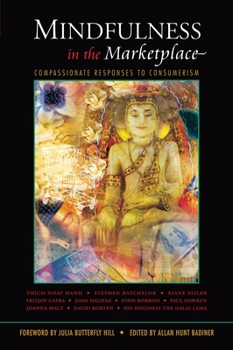Mindfulness in the Marketplace: Compassionate Responses to Consumerism
Mindfulness in the Marketplace suggests a reorientation of consumers from passive purchasers to aware, responsible citizens who see the dynamic connection between their purchases and their values. The... This description may be from another edition of this product.
Format:Paperback
Language:English
ISBN:1888375248
ISBN13:9781888375244
Release Date:August 2005
Publisher:Parallax Press
Length:352 Pages
Weight:1.00 lbs.
Dimensions:0.7" x 6.1" x 9.0"
Customer Reviews
3 ratings
Great message, but it seems to be a bit of a Buddhism recruitment book
Published by alexthgreen47 , 7 years ago
This book really validated how I feel about the current economic systems and consumerism in general, however, the solutions offered in this book always seem to gravitate towards the practice of Buddhism.
Less Consumption - More Compassion
Published by Thriftbooks.com User , 20 years ago
"Engaged Buddhism" is a western term, but the ideal of serving others and the earth has been part of Buddhist life for 2,500 years. Just as one seeks Enlightenment so they can help all sentient beings, one must grow engaged Buddhism within themselves to make a happier and healthier world. You can volunteer at your local hospice, but if you are still driving a gas-guzzling SUV, wearing clothes from manufacturers that utilize child labor, or eating meat, you are no closer to emancipation from samsara than if you were doing nothing. And that's what Mindfulness in the Marketplace: Compassionate Responses to Consumerism is really about - using the ethics of Buddhism to guide every facet of your life to be a better person, which in turn creates a better world. Mindfulness in the Marketplace is a truly well-done and fascinating work. Its wide-ranging topics include Buddhist economics, globalization, manhood and material possession, social transformation, Buddhism and poverty, Zen and money, modern-day slavery and the chocolate industry, domination and overconsumption, the spiritual basis of consumption - in fact, consumption is covered from all angles - and much more. There is a wonderful chapter by Bo Lozoff of the Human Kindness Foundation on the imbalance of career over family, and two perfectly suited companion chapters on "Voluntary Simplicity" by Duane Elgin and "Toward Dematerialization" by Rolf Jucker. Even the oft-taboo topic of "turning [Western] Buddhism into a commodity" is discussed. For the purposes of this VeggieDharma.Org review (the site this review was originally written for), I was interested in the topic of vegetarianism. There are a few vague references to vegetarianism throughout the book, and a compassionate heart will find vegetarianism/veganism to be one of the end effects of many of these essays, but it isn't until Thich Nhat Hanh's chapter, "Looking Deeply at the Nutriments," that the topic is discussed. In Nhat Hanh's usual, clear style, his compassionate plea is undeniable. Later in the book, the devastation of meat-eating and the benefits of vegetarianism are brought to bear by Kate Lawrence, assistant director of the Colorado Community of Mindful Living, in her chapter "Nourishing Ourselves, Nourishing Others: How Mindful Food Choices Reduce Suffering." In these pages, Ms. Lawrence delves into vegetarianism based on the First, Second and Fifth Precepts, the ideal of Right Livelihood, and dispels the confusion over the "killed especially for you" guise that many meat-eaters use as a defense. No compassionate, engaged Buddhist can continue to eat the flesh of animals after reading this chapter. There are a few lists in this book, questions to consider before you buy something, do something, or make a decision - "will this benefit my family or community," "will this harm the environment," things like that - and the book's editor, Allan Hunt Badiner, along with John Seed and Ruth Rosenhek, close out Mindfulness i
Amazing
Published by Thriftbooks.com User , 22 years ago
This book was different than I expected it to be, but definitely better. I thought it was going to be full of tips on how to avoid consumerism and over consumption, but it's more than that. The book is a compilation of writers who are writing on the same topic, but all stories are unique. So instead of getting one opinion on how to change, you are given a story or set of facts and then from there you decipher what is the right way for you to react.The book is interesting, thought provoking, and clarifying. Its for those who want to learn more about consious consumption, and for those who arent satisfied with the Capitalistic society we live in today. This book is for anyone who is interested in the topic. Its definitely not race, class, religious exclusive. What good I have to say about this book will never do it justice, but it is truly amazing.






